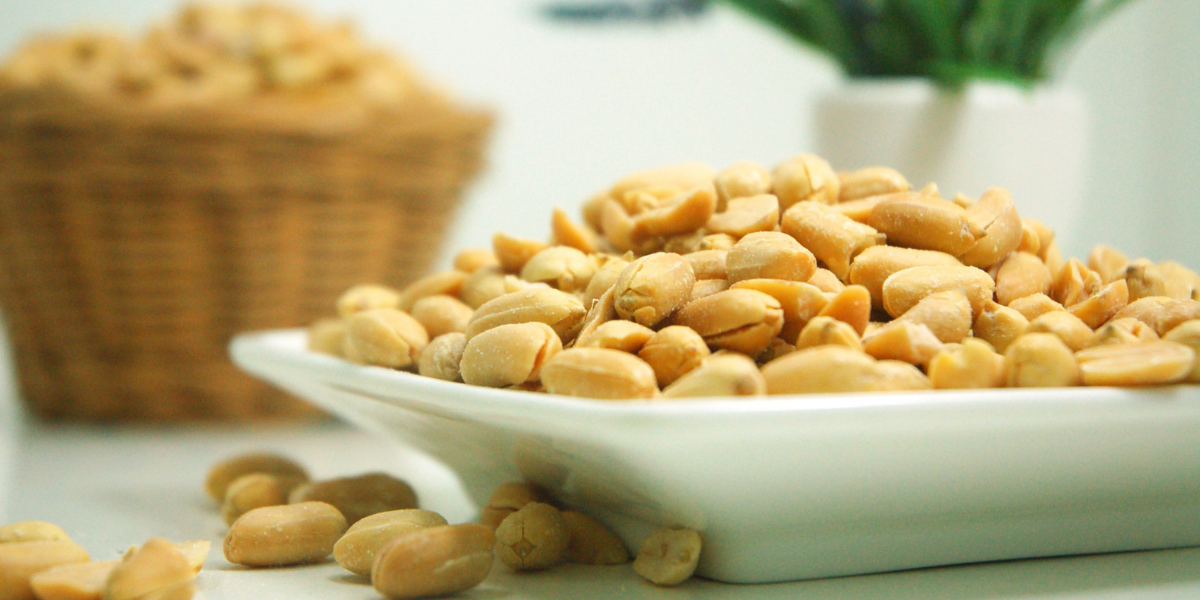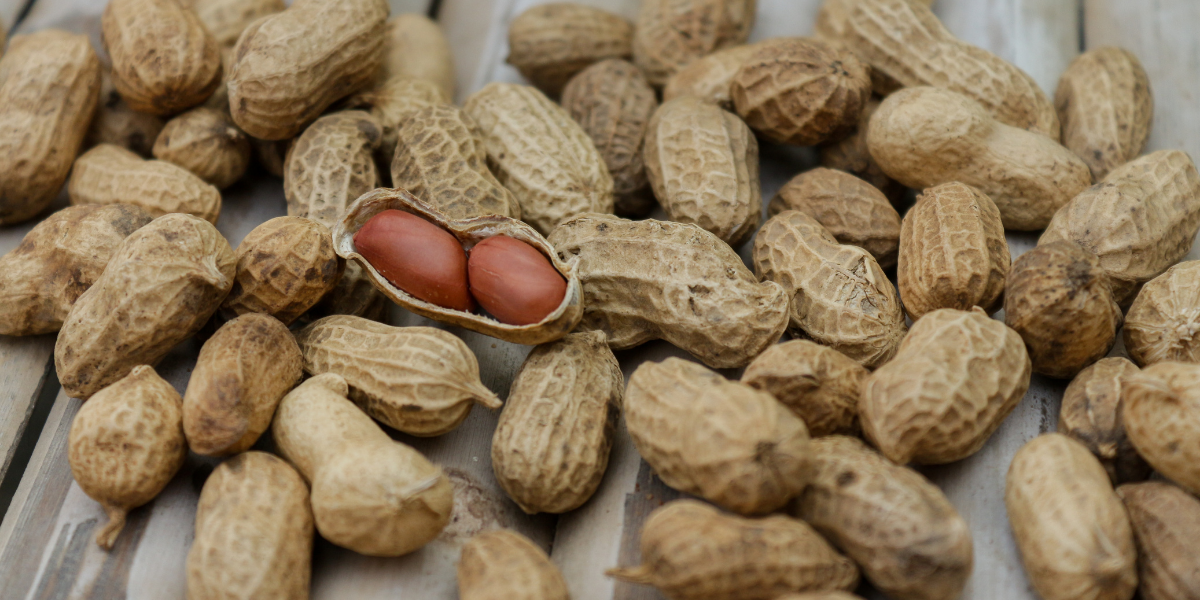The peanut, also called the groundnut or goober, is an all-time snack favorite because it is nutritious and delicious. There are many ways to enjoy peanuts. They can be eaten raw, boiled, fried, blanched, powdered, roasted, or turned into peanut butter. However, some people have a sensitivity to peanuts. To know more about it, let us discuss the symptoms of peanut intolerance.
Peanuts: Background Info

Surprisingly, the peanut belongs to the legume family and is said to have originated in South America, probably in Brazil or Peru. Although there were no fossil records to prove this, ancient pottery decorated with peanuts or made in the shape of peanuts dating from 3500 years ago was discovered in South America. Later on, peanuts were spread throughout the New World by Spanish explorers, and traders brought them to Asia and Africa.
In the 1700s, Africans brought over by slave traders introduced peanuts to North America where it became grown as a commercial crop. They were originally cultivated in Virginia mainly as food, for oil, and as a cocoa substitute. However, it wasn’t until the late 1800s that the peanut’s popularity grew when they were roasted and sold by vendors in PT Barnum’s circus.
In time, studies discovered that peanuts offer numerous health benefits including:
- Promotes cardiovascular health
- Aids in weight loss
- Helps improve vision
- Boosts energy
- Makes brain sharper
- Promotes longer life span
- Helps prevent gallstones
- Reduces cancer risk
- Aids in blood sugar control
- Supports strong bones
- Promotes healthy skin and hair
Peanut Intolerance Vs. Peanut Allergy

Peanuts are very nutritious and beneficial to health. However, a lot of people have a sensitivity to peanuts, and reactions can range from mild to severe. Therefore, it is also important to be able to identify the differences between peanut intolerance and peanut allergy although some of the symptoms may be similar.
What is the difference between a food allergy and food intolerance?
Food allergy is caused by the immune system having sudden adverse reactions to a particular food and they can be triggered by ingesting even just a small amount of this food. Moreover, symptoms occur every time the food is eaten. People who suffer from food allergies are generally warned to completely avoid the troublesome food which, in this case, is peanuts.
On the other hand, food intolerance is often connected to problems with digestion and how much of the offending food has been consumed. In general, you have to eat the food frequently or eat a large portion of it before symptoms appear gradually. Aside from the digestive system, they may also involve the skin and respiratory system.
Symptoms Of Peanut Intolerance

Food sensitivities are becoming more common these days. When you are intolerant to peanuts, symptoms usually appear within a couple of hours upon ingestion. However, symptoms can also be delayed in manifesting for up to 72 hours and last for hours or days.
Here are some of the most common symptoms of peanut intolerance:
-
Stomach pain
Peanuts, along with other nuts, are considered to be high roughage foods which means that they contain plant fibers that your body cannot process easily. This causes stomach pain during digestion.
-
Reflux
Peanuts have such high-fat content that they make the lower esophageal sphincter (LES) lax. As a result, the valve does not close as efficiently as it usually does thereby causing the stomach contents such as acid to back up to the esophagus.
-
Diarrhea
Diarrhea is a common response to peanut intolerance. The intestines are unable to properly digest the proteins contained in the peanuts which can irritate the intestinal lining and cause an upset stomach. Since the food was not processed long enough, it can lead to the formation of loose, watery stools.
-
Nausea
Eating too many peanuts can cause nausea due to the high-calorie, anti–nutrient, and fat content. This is a common digestive reaction to peanuts and usually takes a few hours to occur after consumption.
-
Vomiting
Peanuts are legumes so they contain compounds called phytic acid and tannin which make them hard to digest. This disturbance in the stomach can lead to digestive disturbances such as vomiting.
-
Heartburn
High-fat foods like peanuts may cause heartburn because the fat slows down the emptying of the stomach. When this happens, there’s more pressure in the stomach which pushes the acids back into the esophagus.

-
Headaches
One of the potential triggers for headaches is tyramine, a natural compound found in protein-containing foods. Peanuts, being high in protein, also contain tyramine which can cause severe pulsating headaches.
-
Gas
Peanuts are high in salicylates which are a group of chemicals that, in their natural form, are produced by plants to help them defend against harmful insects, fungus, and disease. One symptom of sensitivity to salicylates is gas or bloating.
-
Irritability
Salted peanuts like the store-bought ones have high amounts of sodium and MSG, a type of food additive that can leave you feeling moody and irritable.
-
Fatigue
Do you feel rundown and tired for no apparent reason after eating peanuts? You can blame amines for that. Amines are organic compounds formed from the breaking down of proteins which peanuts have a lot of.
These symptoms usually appear right after you have knowingly or unknowingly ingested peanuts. Aside from the obvious peanut butter and peanut brittle, here are some other foods to be wary of as they may contain peanuts:
- Cookies and baked goods
- Ice cream
- Candy
- Sauces
- Asian and African cuisines
However, symptoms of peanut intolerance are less serious and easier to manage compared to peanut allergy.
Why Is Peanut Allergy More Serious?

According to statistics published by the Food Allergy Research & Education (FARE), 2018 and 2019 studies estimated that around 6.1 million Americans may be allergic to peanuts. In fact, peanut allergy is the number one most common food allergy in children and the second most common food allergy in adults.
Peanut intolerance and peanut allergy have common symptoms such as stomach pain, diarrhea, nausea, and vomiting. However, in a peanut allergy, your overactive immune system will react to proteins contained in the peanuts and symptoms may include:
- Rashes or itchy skin
- Swelling of face, lips, eyes, and/or throat
- Wheezing or shortness of breath
- Tightening of the throat
- Dizziness or fainting
- Low blood pressure
- Weak and rapid pulse
- Anaphylaxis
A peanut allergy can affect your whole body and not just your stomach. Promptly seek emergency medical help at the onset of a severe allergic reaction. Do not wait for the symptoms to subside as they may lead to life-threatening anaphylaxis or heart attack.
Conflicting Findings

Peanut butter is the most popular and well-loved product derived from peanuts. But like most foods, eating too much of it also has its drawbacks. For one thing, peanut butter can cause you to experience diarrhea which is one of the symptoms of peanut intolerance. This is because peanuts can be difficult to digest.
On the other hand, peanut butter may also cause constipation. The reason for this is its high saturated fat and niacin content as well as a sensitivity to peanuts which can interfere with your usual digestive process.
Sum And Substance

Consuming peanuts in small amounts may bring about amazing results. However, eating too many peanuts can also have a negative impact on your health and may even be dangerous due to potentially life-threatening reactions. In this article, we have discussed some of the symptoms of peanut intolerance so that you can be aware in case you have the condition.

